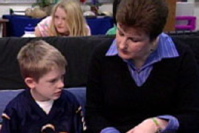WRF’s $400K Targets Reading Recovery Efforts
Reinforcing its commitment to early childhood literacy, the Winthrop Rockefeller Foundation (WRF) has announced a $400,000 grant to UALR and its Reading Recovery training efforts in the Center for Literacy in the UALR College of Education.
The grant, announced at last week’s 20th anniversary Arkansas Reading Recovery and Comprehensive Literacy K-8 Conference and Administrators Institute, is part of the Arkansas Campaign for Grade Level Reading.
 Recently approved by the WRF Board of Directors, the funds will support the expansion of Reading Recovery and the Comprehensive Intervention Model, a research based K-3 literacy intervention designed to improve grade-level reading proficiency.
Recently approved by the WRF Board of Directors, the funds will support the expansion of Reading Recovery and the Comprehensive Intervention Model, a research based K-3 literacy intervention designed to improve grade-level reading proficiency.
WRF’s President, Dr. Sherece Y. West, joined with The Annie E. Casey Foundation’s Executive Vice President Ralph Smith to congratulate Arkansas on 20 years of Reading Recovery in the state and to encourage reading by the end of third grade as a priority for Arkansas.
The Arkansas Campaign for Grade Level Reading, led by the WRF, is a collaborative effort to close the gap in reading achievement that separates many low income students from their peers.
“Children who do not learn to read in the early grades are at risk of becoming high school dropouts,” said Dr. Linda Dorn, director of the UALR Center for Literacy. “Our goal is to prevent reading failure by ensuring that all students are reading on grade level by the end of third grade.”
The campaign promotes policies that lead to better coordination and alignment of services to improve third grade reading proficiency by addressing the developmental and academic targets that children need to reach to be successful.
Arkansas’s campaign is part of a national initiative, led by The Annie E. Casey Foundation and supported by dozens of funders across the nation, to make grade-level reading proficiency for all children by the end of third grade a national priority.
Arkansas is currently ranked 35th in the country for 4th grade literacy proficiency. According to the 2009 National Assessment of Educational Progress (NAEP), 71 percent of Arkansas fourth graders were struggling in reading.
While Arkansas has had improved success with getting students to read in the early grades, the achievement gap among minority and white children was over 20 percent, and the achievement gap between children from low-income families and higher socio-economic families was 28 percent. According to the National Reading Council, high school graduation can be predicted with reasonable accuracy by knowing someone’s reading skills at the end of the third grade.
“In Arkansas, we must increase the number of students graduating from high school and entering college. This goal requires that we begin in the early grades by ensuring that more children are reading on grade level by the end of third grade, thus placing them on track for high school graduation, ” West said.
As a part of the national Campaign for Grade Level Reading, Arkansas is committing significant amounts of time and resources to improving the state’s ranking in grade level reading. A critical first step to changing the statistics is assuring reading on grade level by the end of third grade is a state priority.
“It is all too rare in education that you find a sustained commitment to high standards and ambitious goals for all of our children,” Smith said.
“By putting a stake in the ground to make third grade reading proficiency a priority and through support of effective programs like Reading Recovery, we can help more students become proficient readers and successful learners.”